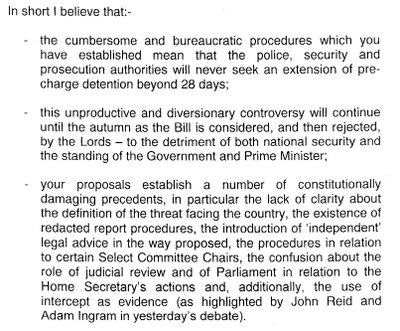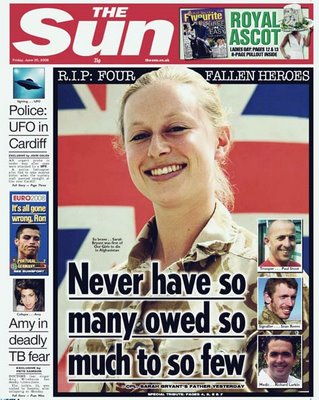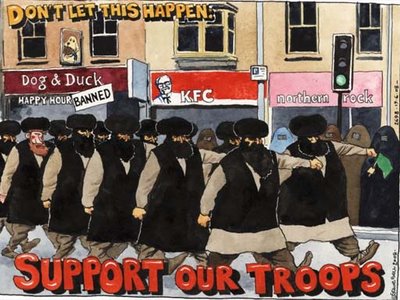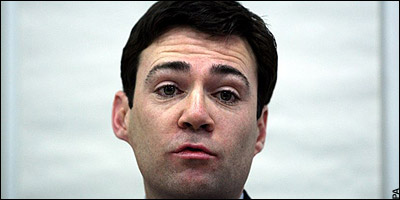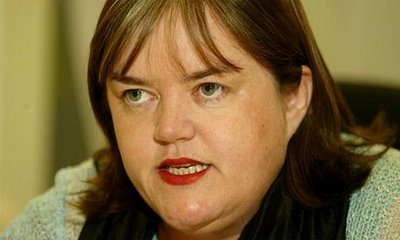 It all now seems such a long time ago, but back in October of last year Gordon Brown made a rather good and generally well-received speech on liberty. Refreshing because of the gaping difference between his apparent favoured approach and that of his predecessor and tabloid pleasing ministers, he set out a narrative in the first half from the Magna Carta to the Human Rights Act, incorporating quotes along the way from such figures as Bolingbroke, Voltaire, de Tocqueville, Orwell, Himmelfarb, Stuart Mill, T. H. Green and Hobson. Never could you have imagined Blair giving such a speech; for him, history was something to be made rather than learned from, and his most infamous and likely to be remembered effort is the speech in which he condemned the values of the 1960s for bringing us to where we are today. The second half where Brown attempted to defend policies bequeathed to him by that man was far less convincing, and it also made clear that he would have no truck with 42-day dissenters while also pretending that he welcomed a debate on it. My added comment is now perhaps worth restating simply because of how wrong I got it in hindsight:
It all now seems such a long time ago, but back in October of last year Gordon Brown made a rather good and generally well-received speech on liberty. Refreshing because of the gaping difference between his apparent favoured approach and that of his predecessor and tabloid pleasing ministers, he set out a narrative in the first half from the Magna Carta to the Human Rights Act, incorporating quotes along the way from such figures as Bolingbroke, Voltaire, de Tocqueville, Orwell, Himmelfarb, Stuart Mill, T. H. Green and Hobson. Never could you have imagined Blair giving such a speech; for him, history was something to be made rather than learned from, and his most infamous and likely to be remembered effort is the speech in which he condemned the values of the 1960s for bringing us to where we are today. The second half where Brown attempted to defend policies bequeathed to him by that man was far less convincing, and it also made clear that he would have no truck with 42-day dissenters while also pretending that he welcomed a debate on it. My added comment is now perhaps worth restating simply because of how wrong I got it in hindsight:
In contrast to my usual dismeanour, I'm optimistic that Brown does mean the majority of what he said in this speech. It doesn't go far enough, obviously, but to pour opprobrium over him as so many over at CiF already have, especially when authoritarians over other matters like David Davis are raising their highly hypocritical heads is to abandon any hope that something might just improve from the Blair days.
With that mea culpa, we're brought back to the present day. Anyone would have thought that the authoritarian David Davis has well and truly put the wind up not just his own party, but the government also. It's unclear whether Brown's speech today to the Institute for Public Policy Research was planned in advance or whether he changed his topic as a result of last week's developments, but that Brown in it covers all the issues on which Davis has said he wishes to fight the government seems more than just a convenient coincidence. Perhaps this is to be the Labour response: not prepared to dignify Davis's "stunt" with an actual candidate, this is to be their submission to Davis's challenge of a debate on civil liberties.
If so, it shows just how paper thin, hollow, patronising and running scared the government is. Up until now, it hasn't been so directly and so significantly challenged over the casual dilution of civil liberties, mainly because the removal has been so stealthily achieved and smoothed over by the popular press in favour of the constant cracking down on crime. Whatever some of those now challenging and cynical of Davis's motives are saying, it can't be denied that his stand has forced at the least a reappraisal and a justification from the government of all that is doing.
From the very beginning, the tone is wrong. Just examine this, the second full sentence:
The modern security challenge is defined by new and unprecedented threats: terrorism; global organised crime; organised drug trafficking and people trafficking. This is the new world in which government must work out how it best discharges its duty to protect people.
But none of these threats are new, and none of them are unprecedented. Brown now seems prepared to pay the same haughty disregard for history as his despised predecessor: terrorism has been with us for hundreds of years (Guy Fawkes, the nihilists, etc etc), and while organised crime has only fairly recently became global in scale, organised crime is nothing new; nor is organised drug trafficking, as the Opium Wars testify, and people trafficking is much the same. This is not a new world, but it's handy to pretend it is so that the government can attempt to justify changes which otherwise would be considered both completely unnecessary and also detrimental to the rights of the "British people" as a whole.
It's this sort of dishonest rhetorical flourish which runs like a thread through the entire speech. Skipping a few hundred words of mostly platitudinous statements, we come upon this next one:
It could be said that for too long we have used nineteenth century means to solve twenty first century problems. Instead we must have twenty first century methods to deal with twenty first century challenges.
As if we hadn't already been using "twenty first century" methods. That isn't of course the implication; the actual implication is that the likes of Davis and other critics are standing in the way of or threatening these decent, progressive "twenty first century methods". The reality is that these "twenty first century" methods have been pushed through with little consultation, such as the establishment of the system which monitors the motorways and can be used to follow almost anyone as they travel across the country, or the huge numbers of CCTV cameras which have been put up with little or no debate over their actual efficacy in either solving or preventing crime.
Brown continues:
So I want to focus today on the use of modern technology in fighting crime and protecting our borders - and focus on the argument that new laws or new technologies threaten the rights of the individual.
Put it this way: while the old world was one where we could use only fingerprints, now we have the technology of DNA.
While the old world relied on the eyes of a policeman out on patrol, today we also have the back-up of CCTV.
While the old world used only photographs to identify people, now we have biometrics.
Of course all these new technologies raise new problems and I will discuss them today. But the answer is not to reject the new 21st century means of detecting and preventing crime - but to simultaneously adopt the new technologies where they can help - and to strengthen the protection of the individual:
· never subjecting the citizen to arbitrary treatment,
· always respecting basic rights and freedoms,
· and, wherever new action is needed, matching it with stronger safeguards and more transparency and scrutiny.
Again, it doesn't seem to matter to Brown's argument that all the technologies he mentions are twentieth century creations rather than twenty-first century ones, but his point remains the same. The difficulty here is that the technologies have been adopted or are to be adopted, while the protection of the individual has been either completely ignored or only been thought of after protest. Brown's listing of where the citizen must be protected is laughable: the citizen already is subject to arbitrary treatment, as we have seen with the recent terror laws on a number of separate occasions, basic rights and freedoms, such as the freedom to protest in the heart of our democracy (on which more in a moment) have been taken away, with the freedom to protest itself under threat in some areas, while "new action" as Brown terms it has never been matched with strong enough safeguards or transparency, as 42 days has so recently demonstrated.
From here, it's little surprise that Brown quickly resorts to an ad-hominem, straw man argument dressed up in typically Brownian patriotic nonsense:
And there is, in my view, a British way of meeting this challenge. The British way cannot be a head-in-the-sand approach that ignores the fact that the world has changed with the advent of terrorism which aims for civilian casualties on a massive scale and which respects not only no law, but also no recognisable moral framework.
Have we got that then? All those opposed to 42 days are head-in-the-sanders, ignoring that the world has changed. It wasn't so long back that even the egregious Tony McNulty was trying to tell us that despite Blair's declaration after 7/7 that the "rules of the game are changing" the government had recognised that it had gone too far. This now seems to have been completely abandoned, and strangely, or not so strangely, just as the government has lost the argument but won the vote.
There's little point going over the 42 day arguments yet again, as Brown does, but there is this that is just pure fiction which is worth highlighting:
This is the driving force behind the proposals the Government is bringing forward - including the counter-terrorism provisions we asked Parliament to approve last week. And we don't suggest these changes to be tough or populist - but because we believe they are necessary.
Except that only a tiny band believe they are necessary, while those that don't include the director of public prosecutions, numerous former attorney generals and government legal advisers, and also even apparently the former head of MI5, Eliza Manningham-Buller. Tough and populist doesn't even begin to cover it. Similarly dishonest and to ignore not just the actions of the past few days but also years is this:
We must recognise that winning the battle of ideas means championing liberty. To say we should ignore the longstanding claims of liberty when faced with the urgent needs of security is tempting to some, but never to me - it would be to embark down an illiberal path that is as unacceptable to the British people as it is to me.
Where were you then Gordon when we imprisoned "foreign terror suspects" indefinitely without charge, only struck down by the law Lords? You didn't hesitate to battle Blair on other measures, but not on that. You've stood by while the control order regime, both illiberal and ineffective in equal measure has been established, while refusing to introduce the intercept evidence which might allow their cases to go to trial. The only thing that seems to have been unacceptable to you is the idea that you would never become prime minister.
Brown moves on:
Take the issue of identity - the second issue I want to discuss today. People's identity is precious and needs to be secure. But is a simple fact that the scale of identity fraud is increasing - that more people are facing distressing and disruptive attempts to steal their identity, and technology has made it far easier for people to perpetuate that fraud. But new technology offers us an opportunity to redress the balance. So one of the best examples of how we can confront the modern criminal while respecting liberties is the use of biometrics, already planned to be introduced into passports across the world, but also offering us the opportunity to protect individuals' identities in their everyday lives.
We know that as many as one in four criminals use false identities - and with terrorist suspects it is almost universal. One September 11th hijacker used 30 false identities to obtain credit cards and a quarter of a million dollars of debt. Many terrorist suspects arrested since 2001 have had large numbers of false identities. No one is suggesting that an identity card scheme will stop terrorist attacks overnight. But if it can make it harder for people not just to travel across borders with multiple identities, but also to raise money or rent safe houses or buy sensitive material - all anonymously - it can potentially disrupt the operations of terrorists and other criminals - something we must surely be making every effort to do.
Note that although Brown mentions a September the 11th hijacker he doesn't say anything about the Madrid bombers, all of whom had ID cards. This specific linking of terrorists with the ID card system is something Brown eschewed in his previous speech, precisely because they will do nothing whatsoever to prevent terrorism, as ministers know only too well. Terrorist use of false identities is almost always incidental in any case - the 7/7 bombers had details of who they were on them, as they wanted to be identified, as other martyrdom seekers do.
But as well as the contribution which I believe a biometric identity scheme can make to these national challenges, I believe it can also make a powerful contribution on an individual level to our personal security. Opponents of the identity card scheme like to suggest that its sole motivation is to enhance the power of the state - but in fact it starts from a recognition of the importance of something which is fundamental to the rights of the individual: the right to have your identity protected and secure. This is why, despite years of exaggeration about its costs and its implications for liberty, public support for it remains so strong.
It again matters little that the costs have not been exaggerated, as shown by the already staggering cost of the scheme, with the cost of an ID card likely to be in the region of £93, all for the privilege of proving who you are, or that the cards will quickly be open to forgery, as all other systems have been, what it comes down to is Brown and the government telling us it will make your identities more secure. Strangely, no one believes them.
People understand the value of secure identity. In banking, to protect their money, people were happy to move from signatures to PIN numbers. Increasingly they are moving to biometrics - for example, many people now have laptops activated by finger-scans.
Which completely misses the point that they themselves are the ones personally in control of that. With the ID card scheme, we are not, and we don't trust those who are.
But as with our proposals on terrorist legislation, we must match our efforts to improve our security with stronger safeguards on liberty. We have no plans for it to become compulsory for people to carry an ID card. We have made this clear in the legislation: that the identity card scheme will not be used to place new requirements on people, but, on those occasions in everyday life where people already have to carry ID - if they want to prove their age, or open a bank account, or apply for a job, or register with a GP - it will provide a better, more convenient and more secure way of doing it, not just relying on a couple of utility bills, and one which meets a national standard.
Yet more layers of bullshit. If the scheme is not to become compulsory, the government wouldn't be spending such a ridiculous amount on it, and it's incredibly likely to become so once they think it's reached critical mass, hence the wonderful idea to force it on public servants and students first, the kind of people who are both disliked and who can do very little about it in turn. It's also worth asking what the point of the huge database is behind the system if all this is going to be a simple, pleasant little user-friendly tool which will just help us prove who we are. We could set up a simple national standard scheme based on the smallest amount of information possible in a fraction of the time and cost. Instead we have a completely exorbitant scheme making use of the most information possible, with fines for those who eventually refuse to have one.
I welcome the report of the all-party Home Affairs Select Committee on 5 June, which - based not on knee-jerk reactions but a year of thorough and impartial research - firmly rejected the characterisation of Britain as a "Surveillance Society" - but warned at the same time against complacency, and called for both practical measures and principled commitments from the Government to ensure the balance of liberty and security is maintained.
Here we have yet more obfuscation and selective reading on the part of Brown. The report by the HASC in fact specifically warned that we were in danger of becoming a "surveillance society" and said that the ID card scheme was potentially one of the biggest threats of that becoming reality because of the possibility it could be used to routinely spy on the individual.
Having completely failed to even begin to make the case for ID cards, Brown moves on to CCTV:
From the IRA terrorist campaign in the 1990s and the Brixton nail bomber in 1999, to the terrorist incidents in London in July 2005, CCTV either used by the police or released to the public helped in the identification of suspects, and played an important role in the subsequent prosecutions. In central Newcastle, after CCTV was installed, burglaries fell by 56 per cent, criminal damage by 34 per cent, and theft by 11 per cent.It is the clear benefits of CCTV in fighting crime - from terrorism down to anti-social behaviour - which have led to its increased use by the police and transport and local authorities - and also by shops and businesses. The role of Government however is not just to identify the opportunities for improving our security but, again, to match them with strong safeguards on our liberty and privacy. We absolutely accept the challenge set down by the Home Affairs Committee: that we must demonstrate that "any extension of the use of camera surveillance is justified by evidence of its effectiveness". And I can tell you today that in addition to the safeguards set out in our CCTV strategy in November we are happy to accept the Committee's recommendation that the Information Commissioner should produce an annual report on the state of surveillance in the UK for Parliamentary debate.
So let us not pretend that CCTV is intrinsically the enemy of liberty. Used correctly, with the right and proper safeguards, CCTV cuts crime, and makes people feel safer - in some cases, it actually helps give them back their liberty, the liberty to go about their everyday lives with reassurance.
Here Brown here makes no real case for CCTV having prevented crime. Yes, in certain cases it does a fine job in identifying those that have committed crimes, but as for prevention the case has simply not been made by anyone. It would be interesting to know when Newcastle introduced its CCTV scheme and whether this is any correlation with its installation, or whether the drop is simply because crime has fell substantially over the last 10 years, but Brown doesn't provide any background, only figures which are easily amenable. A police officer recently revealed that only 3% of street crime in London, a place completely covered with CCTV, is solved using cameras, and this is a point David Davis has directly made. Many of them simply don't provide high enough quality images to be used in prosecutions, making them useless while doing nothing to reassure anyone, with the opposite often being the case. CCTV may make some feel safer, but it's a false, irrational sense of safety which is quickly forgotten. It is a praiseworthy move that the information commissioner will produce a yearly report on the state of surveillance, but whether any suggestions the report makes will be listened to or properly debated is another matter.
Finally then, to the DNA database:
Through a series of careful changes we have made DNA one of the most effective tools in fighting crime. And we have worked with the police and also the Home Affairs Select Committee and others to ensure that proper safeguards are in place.
As a result, the National DNA Database has revolutionised the way the police protect the public. In the last full year for which figures have been made public, the DNA database matched suspects with over 40,000 crimes. That's over a hundred crimes a day which would be harder to solve, sometimes impossible, without the use of DNA - including 450 homicides, almost 650 rapes, over 200 other sex offences, almost 2,000 violent offences and over 8,500 burglaries.
Again, it's not clear whether in these cases the suspect's DNA was already on the database or whether when they were arrested it was taken and then subsequently matched in order to confirm the police's case against them. No one is going to dispute that the DNA database is an incredibly helpful tool to the police which has helped them solve numerous crimes, it's over what Brown next turns to where there is real concern:
I say to those who questioned the changes in the Criminal Justice and Police Act 2001, which allowed DNA to be retained from all charged suspects even if not found guilty: if we had not made this change, 8,000 suspects who have been matched with crime scenes since 2001 would in all probability have got away, their DNA having been deleted from the database. This includes 114 murders, 55 attempted murders, 116 rapes, 68 other sexual offences, 119 aggravated burglaries, and 127 drugs offences.
And I say to those who opposed the proposals in the Criminal Justice Act 2003, to allow the police to take DNA samples not just from those charged, but from all those arrested for serious, recordable offences: again, if we had not made this change, there would be serious and dangerous criminals escaping justice and continuing to pose a threat to the public. It is simply not responsible government to let such opportunities to use new technologies to protect the public pass us by.
But again, we have matched these careful extensions in the use of DNA with the right safeguards: DNA can only be recorded for people arrested for a recordable offence; the use of that DNA has clear limits set down in legislation, by the Police and Criminal Evidence Act; and there are stringent limits on those who are able to access the information.
I don't think that anyone is now suggesting that data taken from those arrested should not at least be checked with the database to confirm that they are not a match for other serious offences, as this is after all how the likes of Mark Dixie have been convicted. Instead, there needs to be a compromise, where those who have been arrested but never charged with any crime have their data checked and if nothing comes up, then and only then should it be removed and destroyed. The problem is that we simply can't trust the police to do this, as previous cases where children who have been arrested for something completely trivial have shown, with police procrastinating and only finally destroying their fingerprints and DNA sample when parents went to the press and demanded it be done while they were present. More specifically the real concern is that the police and government are acquiring and attempting to create a representative database by stealth, and as ever more minute amounts of DNA are taken from crime scenes, the potential for miscarriages of justice increases greatly. The recent prosecution of Sean Hoey and the case of Shirley McKie are testament to this, and some might also point towards the minute amounts of samples taken from the fibres in the back of the McCann's hire car, directly leading to the lurid accusations against them also.
Brown is of course also being completely disengenuous: the police can now arrest anyone for almost any reason they can think of if they're so inclined, thanks to the final removal of any distinction over what an arrestable offence is and isn't. They're then perfectly within their rights to take your fingerprints and a DNA sample, and there's absolutely nothing you can do about it, whether you're charged with any crime or not. Seeing as the government has also then created somewhere in the region of 3,000 new offences which you can be charged with, there's plenty of room for manoeuvre.
We are now approaching the end, but Brown leaves one of the most astonishing and risible claims until now:
And it is a measure of the emphasis that we place on at all times advancing the liberties of the individual that we have in the past year done more to extend freedom of speech, freedom of assembly, freedom of the press and freedom of information. To summarise, we have given people new rights to protest outside Parliament
No you haven't - all you've done is given us our old right back! How typically New Labour to claim credit for something which they've first taken away, only to then give back. And that's not all:
We have removed barriers to investigative journalism
By removed barriers, Brown must mean "allowed tabloid scum to keep digging into celebrity lowlife and anyone ever accused of any crime" via private investigators and the very databases which Brown has just spent so much time eulogising while claiming to be secure!
It's this though that even defeats both of the above for being completely ridiculous and out-of-touch with reality:
And I agree with those who argue that the very freedoms we have built up over generations are the freedoms terrorists most want to destroy. And we must not - we will not - allow them to do so.
Except you've just admirably done their job for them. Why do they need to bother when the prime minister can hide behind technological developments and blatant scaremongering on how deadly the threat it is for further extending detention without charge and removing the very liberties they loathe?
If the prime minister so believes all of the above though, instead of just making a speech on it, why doesn't he and his party stand a candidate arguing all of the above against David Davis? If you're so sure of your case, and in some places it is more credible than in others, why not stand by your convictions? That Brown won't but that he will make a speech rather than enter into open debate suggests that he knows full well that he and the government would lose the argument, just as they did over 42 days even if they won the vote. Isn't this the prime minister that has so cornered the market in writing about courage? On civil liberties, Brown really can be accused of bottling it.
Related posts:
OurKingdom - Brown dumps UK's national security strategy
Rachel North - Scared New World
Lee Griffin - We must remove civil liberties to give you freedom
Labels: 42 days, CCTV, civil liberties, David Davis, DNA database, fisks, Gordon Brown, ID cards, Security and Liberty can be protected speech
